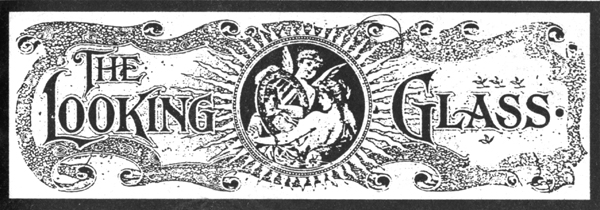
Orth Harper Stein’s 12-page weekly The Looking Place by 1895 claimed to have the largest non-subscription sales of any newspaper in Atlanta. Thousands of Atlantans and other Georgians anticipated the Saturday dose of gossip and scandalous news from The Looking Glass, and they were rarely disappointed. After two years of publication, Stein had expanded his leadership far beyond Atlanta by the addition of a column on Page 11 called “Out-of-Town Gossip.” This column was compiled from anonymous correspondents throughout the state and in Alabama and South Carolina. The Correspondents sent in local gossip, often of a shocking nature, which would never have been printed in their hometown papers. “Out-of-Town Gossip” often contained accounts of governmental corruption or election fraud, but mostly consisted of rumors of fiscal and sexual misconduct. No names were named, but sufficient information was usually given for identities to be plain to hometown readers. The regular Athens column, for example, included reports of young ladies being sent home from the Lucy Cobb Institute “in an interesting condition” as the upshot of late-night trysts with UGA students in the abandoned bowling alley behind the school. The correspondent was also fond of detailing the alcoholic havoc wreaked by the sons of prominent Athens families at social functions.
“Out-of-Town Gossip” was a source of delight and terror for small-town Georgians and it was inevitable that some of Stein’s rural chickens would come to Atlanta to roost. On April 4, 1895, Dr. J.L. Stokes, a dentist from Madison, entered the offices of The Looking Glass with two other men. He demanded that Stein tell him the identity of the Madison correspondent who had sent in an item about a $50 shortage in the treasury of Madison’s women’s club which had had to be covered by the treasurer’s husband, evidently none other than Dr. Stokes himself. Stein refused to give them the correspondent’s name and asked Dr. Stokes to return in a few hours. Stein sent for two policemen, whose presence put a damper on Dr. Stokes when he came back to the office. Stokes returned to Madison and swore out a warrant for criminal libel, a misdemeanor, against Stein. The Morgan County sheriff took the warrant to the Fulton County sheriff, who served the paper in Stein’s office and took his bond on the spot.
Within three weeks, Stein was served with another warrant for criminal libel, this time by a deputy sheriff from Barrow County. The warrant was sworn out by William Graham of Cartersville in response to a Looking Glass item described by the Journal as “about the marriage relations of a young couple who have been divorced.” Stein told the deputy that he was prepared to give bond and let both of them be about their business, but the deputy said he had specific instructions to accept no bond from the big-city editor, but to take him to Cartersville and lodge him in the county jail, at which point Stein might try to get someone to bail him out. Stein’s attorney filed a writ of habeas corpus and argued that Stein’s life would be in danger if he were taken to Barrow County. The circuit solicitor representing the deputy taunted Stein as a coward and pointed out that the law prohibited sheriffs from accepting bond on any but bench warrants; Stein would have to be taken to Cartersville. The judge had to agree with the solicitor, but managed to get him to let Stein post bond in Atlanta “as a courtesy.” Both of Stein’s out-of-town criminal libel cases were eventually settled out of court.
At about this time Orth Stein published the most controversial story yet to appear in The Looking Glass. In Appling County in 1894 the trial of David Crosby for the murder of Mike McCarty ended in a hung jury. A new trial was scheduled, but in the meantime The Looking Glass reported that J.L. Sweat, the presiding judge, had been seen ascending a private back stairway to his room at the Wigwam Hotel at Indian Springs in the company of defendant Crosby’s young and attractive wife. Crosby was promptly acquitted and the scandal spread into the state’s more respectable papers. The furor failed to die down and Judge Sweat was tried before a state Senate committee in January 1897. They found him innocent of any criminal charges but censured him for his conduct with Mrs. Crosby at the Wigwam.
Orth Stein was now an acknowledged force in Georgia journalism and politics, but he was accumulating many powerful enemies along the way.
© 1994 John Ryan Seawright
Like what you just read? Support Flagpole by making a donation today. Every dollar you give helps fund our ongoing mission to provide Athens with quality, independent journalism.







